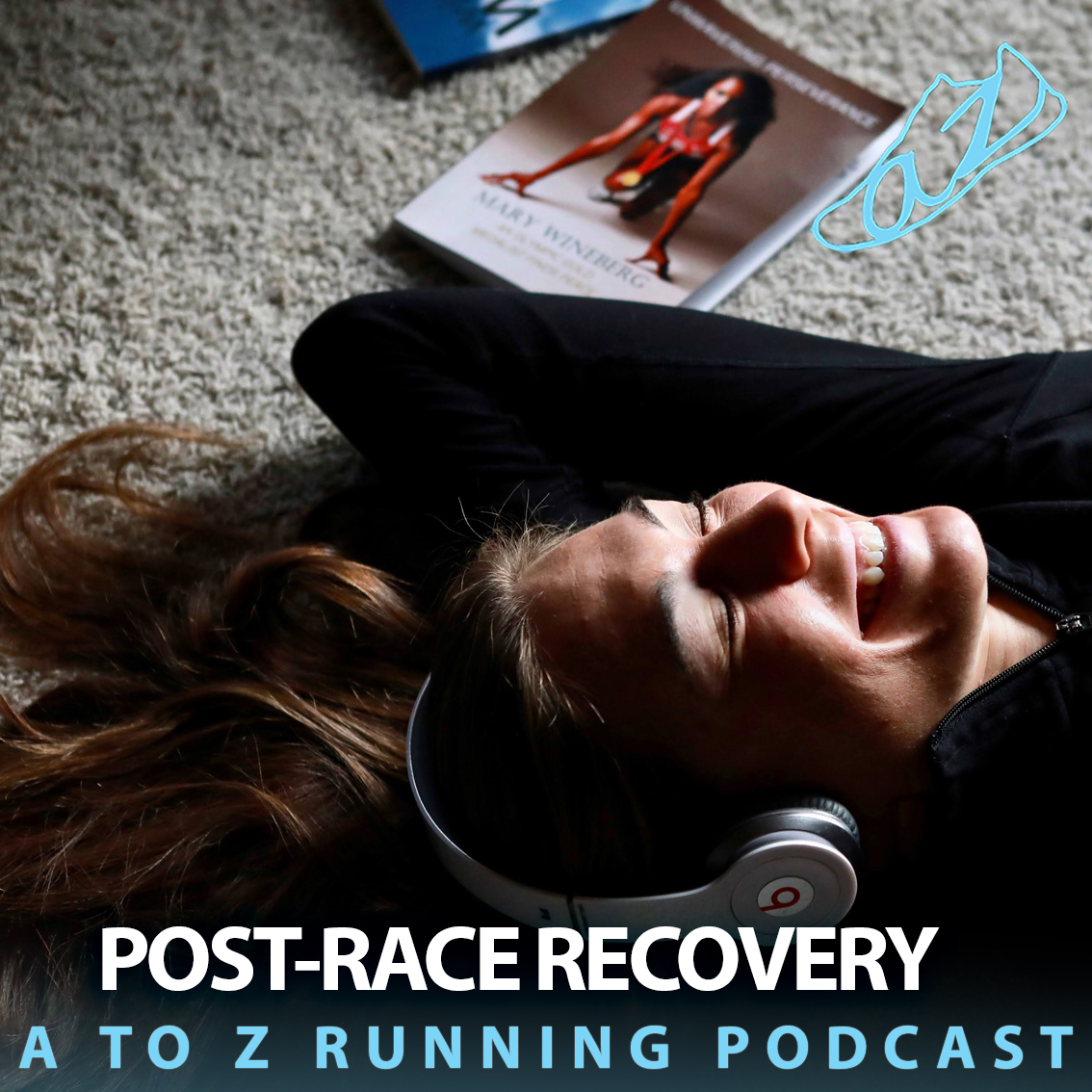LISTEN
This week on the A to Z Running Podcast we discuss post-race recovery for runners. It is important to consider and respect all your body has gone through preparing and executing a marathon. Hungry to get back to training and racing? Give your body and mind the recovery it needs! Tune in!
INTRO
- FOLLOW and SUBSCRIBE
- How would you answer this, “First thing I want after finishing a marathon?”
- Check out Rooftree Elite Massage Gun! It’s powerful, quality, effective, and has long-lasting battery life.

MAIN TOPIC: Post-race Recovery
Has the marathon left you feeling energized, spent, sore, totally trashed? Whatever your state, your body needs to recover.
Ideally sooner rather than later.
To do so, body needs 3 things:
- Rest
- Blood flow
- Nutrition
Our ability to recover fully and quickly depends on our ability to optimize these three things.
(Side note, perhaps an even greater influence on recovery is the actual preparation.
- Proper training yields not only better results but better recovery as well, and that should never be underestimated.
- Hate the way you feel after a marathon?
- Might be that some key changes to your training could lessen that.)
The question in this monologue is why do those three things matter and how can we optimize them?
Rest: not just about taking a few days off
Most of us forget that rest is about more than staying off tired legs or sore muscles for a bit…
- Musculoskeletal system needs to rest (trauma to tissues and bones)
- Microtears
- Possible stress responses
- What to do?
- Sleep! It’s when the body repairs itself best
- Avoid impact forces
- Change positions often (sitting, standing, walking, lying)
- More on this in a moment…
- Energy system needs to rest
- Depleted fuel stores (more on this in nutrition)
- Cellular recovery (mitochondria and energy production)
- What to do?
- Stay low key (once again… sleep!)
- Refuel
- Nervous system fatigue
- Especially prevalent in long-term hard efforts or short-term very intense efforts
- Mental and emotional influence
- What to do?
- SLEEP!
- Avoid high-stimulation activities
- Read a relaxing, pleasant book
- Stare out the window – or better yet, sit outside and watch the grass grow
Quick summary: at it’s core, the need for rest in any of the above areas is best addressed by plenty of sleep foremost, but some of the little things do really make a difference.
- Bill’s example: take the next day off work
- Don’t try to travel right away after the race (maybe even the next day)
Blood Flow: bringing the good stuff where it needs to be
If fatigue and all that is poverty, nutrition is gold, and blood is the Genie in the lamp, granting all your body parts all their wildest hopes and dreams.
Or something like that…
The point is that uninhibited blood flow is the imperative to recovery. Resting is great, but if the blood isn’t flowing properly, all that rest ultimately does us little good.
- Blood carries in oxygen
- Blood carries in nutrients
- Blood carries out bad stuff
What inhibits or reduces blood flow?
- Dehydration (blood is mostly water, after all)
- Inflammation (blood pooling means not as much flowing)
- Constricted fibers
What do we do about it?
- Drinks loads of water (and be sure electrolytes are present)
- Take some light anti-inflammatories (potentially – they are known to speed recovery for a day or two after a hard effort, but we don’t give medical advice here, so talk to a doctor or something first)
- Drink more water
- Gentle tissue massages and myofascial releases to keep the fibers flowing smoothly
- Keep drinking water
- Activation and activity that avoids impact if possible (walk, bike, even just bicycle your legs in the air while lying on your back)
- And of course… water.
Lots of fun little devices out there designed around this idea:
- Electrical stimulation (especially encouraged during sedentary times like flying or driving long distances… but maybe not if YOU’RE the one behind the yoke or the wheel…)
- Massage guns (like the rooftree product we’ve been discussing)
- Vibrating rollers (be gentle, though)
Quick summary: you’re not going to like me saying this, but remember that some things are exactly COUNTER to the logic here, like toxins that enter your blood, diarrhetics, etc.
- Many of us view race day as the immediate conclusion of our hard work and discipline, at least for a little while.
- We probably shouldn’t.
- Maybe give ourselves two more days of disciplined recovery.
And on that note…
Nutrition: eat well, eat lots, eat often
We cannot overstate the importance of replenishing everything as quickly as possible. And not just the obvious stuff like protein and carbs…
Start with the macros
- The first priority is getting those fuel stores back up a bit
- Protein, carbs, and fats are all necessary for the repair process, though especially protein and carbs
- The big fad around proper ratios is all very interesting, but it makes little difference if I’m not getting enough.
- Remember how the body absorbs things: far more effective to consume moderate quantities frequently than large quantities occasionally
Do NOT miss the micros
- Micronutrients make the body function
- If your muscles run out of available calcium, where do they turn? Your bones!
- Magnesium helps muscles relax and aids the digestion of macronutrients
- Iron is a key ingredient in hemoglobin and thus helps transport oxygen
- Zinc is involved in energy metabolism as well as helping synthesize hemoglobin
- Vitamin D helps the body absorb things like calcium, zinc, and magnesium (among other roles)
- Vitamin C helps the body absorb iron
- And ALL of these things are utilized and depleted in some fashion during races, especially long ones
- Boosting micronutrient intake after races is yet another method of ensuring the body is getting what it needs to perform it’s essential functions well
- We are almost definitely NOT getting enough of these things just by our normal diet (not for recovery purposes, at least, and probably not for day-to-day either)
Another note about absorption…
- The body only has so many ways to absorb a given thing, so spreading out the intake more gradually over time helps increase how much is absorbed
- (think: eat a massive meal in 30 minutes is less total absorption than the same amount of food spread over 2 hours)
- Some things absorb better and worse in a given category or are aided by the combination with another thing… it’s worth paying attention to this stuff… but also not enough time to really go into that right now
Quick summary: eat well (and supplement), eat lots (meaning VARIETY), and eat often to maximize absorption
Conclusion: we want to feel as good as possible as soon as possible
The entire motivation for the principle of recovery is either that you have another thing you want to get to or you simply want to feel good in general.
Do the good work now and reap the rewards later.
Functional Movement Resources
- Jay Dicharry’s Running Rewired
- Functional Movement Assessment (chapter 17 from Musculoskeletal Interventions: Techniques for Therapeutic Exercise)
WORLD OF RUNNING
Congrats to our A to Z Runners who raced this weekend! A couple half marathons from Kristi and Emily. Chicago marathoners Bill & Julie. At the Boston Marathon Kathy, Terry, Erin, Dan, and a PR for Zach
WHEN: Sunday Oct 10, 2021
WHERE: Chicago, IL
WHAT: Chicago Marathon
FUN FACT: It takes 16 days to set up the Chicago Marathon and 5 days to tear everything down. 2 days to remove the goose poop from the grass.
- Setting the stage… NBC Chicago reported that conditions had not been this warm since 2007. Race temps were in the 70s and humid.
- Mens
- Seifu Tura is the first Ethiopian men’s winner since 2012 in 2:06:12. This is his first major marathon win, but has won the Milan and Shanghai Marathons
- USA’s Galen Rupp ran the closest to his PR on the podium with a 2:06:35. Rupps PR 2:06:07 which he ran in Prague in 2018.
- Group of 3 men in the final quarter of the race included 3rd place finisher, Eric Kiptanui with a time of 2:06:51.
- Womens
- 2019 world champion Ruth Chepngetich, 2:22:31. This was Ruth’s first marathon on American soil. She is the 4th fastest female marathoner in the world’s history with a PR of 2:17:08.
- Emma Bates placed 4th overall in her 2019 Chicago Marathon posting in August that she wanted to crack the top 3. Running a conservative race due to the weather, Emma reeled in the pack and eventually overtook the chase group.
- Due to the weather, Sara Hall adjusted her goals for the marathon from the American Record to finishing as well as possible. In a post-race interview with NBC she said she thought she was going out conservatively, but in hindsight should have gone out slower.
- Keira D’Amato claims a 4th place finish after injuries kept her from competing at the US Olympic Track and Field Trials.
WHEN: Monday Oct 11, 2021
WHERE: Boston, MA
WHAT: Boston Marathon
Fun Fact: The Boston Marathon is the only major marathon to be held on a weekday!
- 125th Boston Marathon, 910 days of waiting
- Mens
- Benson Kipruto of Kenya in 2:09:51, even though it was Kipruto’s first major marathon win, he was also the marathon champion at both the 2021 Prague Marathon and the 2018 Toronto Marathon.
- Two American men claimed finishes in the Top 10
- Colin Bennie was 7th place in time of 02:11:26. He has run under 2:10 at the Marathon Project last year and is one to be paying attention to.
- CJ Abertson had the lead at 1:40 and finished 10th with an unofficial time of 02:11:44. Alberston was interviewed about his strategy. Albertson on banking the downhills. CJ held the all-surface 50-kilometer world best of 2:42:30 on a track in 2020 which has since been broken.
- Womens
- Diana Kipyokei of Kenya 2:24:45
- Kipyogei won the race in her debut. Kipyogei took charge 18 miles into the race, but was caught by Ethiopia’s Netsanet Gudeta. Kipyogei then the the race back aroumd 24 miles. (according to USA Today)
- The first American woman to cross was Nell Rojas in 02:27:12 for sixth place overall.
- Diana Kipyokei of Kenya 2:24:45
WHEN: Monday Oct 11, 2021
WHERE: Portage, MI
WHAT: Portage XC Invitational
- Dathan Ritzenhein’s high school Portage Invitational Record falls after 20 years.
- Riley Hough runs a blazing 14:37.1
- The only person to come close in 20 years was Grant Fisher in a time of 14:42 just shy of Ritzenhein’s 14:41 record.
- Riley has the second fastest time by a high schooler in the event behind Ritzenhein in the country. Back in 2000, Ritz posted a U.S. No. 1 all-time 5K effort of 14:10.40.
- Here’s to hoping for another Footlocker Champion from Michigan.
Relevant episodes with Emma Bates, Keira D’Amato, and Dathan Ritzenhein.
Interested in a training plan and/or coaching? We offer personalized support to help you achieve your goals!




Leave a Reply
Want to join the discussion?Feel free to contribute!